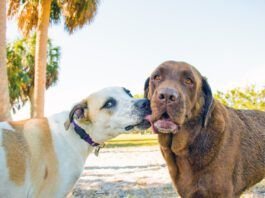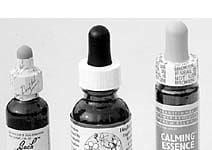Pros and Cons of Electric Underground Fences
Electronic fences and their partners collars that deliver an aversive agent have been around for more than 20 years. They seem like the perfect canine confinement alternative to a solid physical fence. They are often marketed as the ideal fencing solution to homeowner association fence prohibitions and for problematic, difficult-to-fence, steep, rocky and rugged living spaces. But while occurrences of a collar shorting out and administering repeated shocks to a hapless, helpless dog are relatively rare, there are other drawbacks to using electronic fencing systems. A conscientious owner will weigh all the pros and cons before deciding whether or not to invest in this sort of fencing" system. "
Be Cautious While Tying Your Dog in the Backyard
I was trying to be a responsible dog owner. We lived in a rural area of Northern California, in a house with no fenced yard. My boyfriend's Irish Setter had recently been shot and killed while chasing a neighbor's goats. A hard lesson to learn, and one I wasn't about to repeat. So when we were leaving the ranch for a day I insisted we tie up our recently acquired St. Bernard, Bear. We tied him to a tree, made sure he had access to plenty of water and shade and was nowhere near a fence that he could climb over. Confident that we had done the right thing, we drove off.
Dogs With An Unhealthy Fear of Storms and Loud Noises
Many behaviorists and dog trainers believe that puppies go through a so-called fear imprinting" period sometime between the ages of eight to 20 weeks
Rottie “Racism”?
People fear Rottweilers for a variety of reasons, and only a few of those reasons are due to the media. Some Rottie owners deliberately foster the intimidating look, fastening huge Gothic collars on their dogs and encouraging their dogs to be aggressive. Many Rottweilers are used for guard and protection work, a task they were bred for and excel at. And, face it, whether you want to blame nature or nurture (poor breeding or wrong-headed training), there are a certain number of aggressive, unpredictable, dangerous Rottweilers in the world.
Canine Road Rage
at least until the NILIF program has had a chance to take effect. If he jumps into the car and immediately takes up his position at the steering wheel
Training Classes for Aggressive Dogs
dog owners are taught to recognize behavioral signs of impending aggression
A Holistic Dog Behavior Consultant’s Opinion on Dog Door Aggression
As a holistic behavior consultant, I believe that most problems people experience with their dogs are not really dog problems but rather communication problems. Dogs don't have problems being dogs; they have problems being dogs who live with humans. Most humans don't even know how to communicate with each other! Every interaction you have with a dog teaches the dog something about living with a human.
The Ancestral Dog Food Diet
Dog food as we know it today that is, either crumbly bits of kibble packaged in bags and boxes or gloopy meat-based concoctions sealed into cans was invented in 1860. Think about that for a moment. Our great-grandparents and great-great-grandparents raised dogs completely without the benefit of Purina. Before 1860, no one poured a pile of chow from a bag marked, Dog." Everyone who had a dog knew what dogs ate and how to feed them. "
Is Your Dog Afraid of Thunder?
Everyone knows a thunderstorm horror story. A terrified dog leaps off a balcony or breaks through a plate glass window before jumping a fence, running into traffic, and meeting an unhappy fate. Or the animal simply disappears and is never seen again. More common and just as distressing are the panic attacks that overcome stay-at-home dogs when thunder roars or the neighbors light firecrackers. Conventional veterinary medicine treats thunderstorm and other noise phobias with powerful tranquilizers or psychoactive drugs, none of which cure the patient and all of which have adverse side effects.
Noise-Phobic Dogs
As unlikely as it sounds, one of the most effective treatments for thunderstorm phobias may be an over-the-counter hormone used by humans to prevent insomnia. Melatonin, produced by the pineal gland, sets the body’s internal clock in response to exposure to light. The body creates melatonin only in total darkness, for the pineal gland stops production when any part of the body, even the back of the leg, is exposed to light. In people, melatonin has been shown to calm the nerves, reduce anxiety, relieve panic disorders, prevent migraine headaches, facilitate deep sleep, and, according to some researchers, help slow the effects of aging.
Telepathic Communication With Your Dog
Have you ever looked up suddenly and seen your dog staring at you intensely, longingly – a look that grows no less pleading when you offer treats, a walk, or a scratch behind the ears? Or perhaps you’ve seen your dog leap up at some seemingly nonexistent noise, sniffing and whining for no reason you can imagine. Have you wished that you could know what your animal wants, understand what he’s thinking? Or have you ever wondered, when your dog mysteriously disappears at bath time, if he knows what you’re thinking?
When Your Well-Trained Dog Turns Aggressive – Act Fast!
I first met Lucy at my local monthly “My Dog Can Do That” competition in January of 1998, at the SPCA in Monterey, California. She was easy to spot – a merle Great Dane with lovely natural ears, who literally towered above the competition. Lucy was attentive, responsive, performed even the most advanced MDCDT behaviors with ease, and consistently placed in the ribbons. It surprised me, then, when a few months later I heard Lucy had started threatening humans, and her aggression was escalating. This was not appropriate behavior for any dog, but particularly disturbing in one of Lucy’s size, with her potential for causing serious harm.















